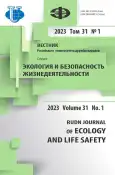Rewilding in megacities: from concept to implementation
- Авторлар: Fedorchenko L.Y.1, Bobkova A.A.1, Nikiforov A.I.1,2
-
Мекемелер:
- Moscow State Institute of International Relations (University)
- Russian Federal Research Institute of Fisheries and Oceanography
- Шығарылым: Том 31, № 1 (2023)
- Беттер: 20-29
- Бөлім: Ecology
- URL: https://journal-vniispk.ru/2313-2310/article/view/323950
- DOI: https://doi.org/10.22363/2313-2310-2023-31-1-20-29
- EDN: https://elibrary.ru/RRGPJQ
- ID: 323950
Дәйексөз келтіру
Толық мәтін
Аннотация
The expansion of urban agglomerations and the accompanying increase in the severity of environmental problems require special attention to ensure a comfortable urban environment. One of the ways to solve this problem is to create an ecological framework in the megacity, formed by quasi-natural biocenoses, created within the application of the concept of rewilding. This article reviews the main current trends and approaches to the implementation of rewilding; discusses positive and negative environmental effects of the transformation of urban ecosystems within rewilding; presents an analytical review of available techniques and options for rewilding in various megacities around the world.
Негізгі сөздер
Авторлар туралы
Leonid Fedorchenko
Moscow State Institute of International Relations (University)
Хат алмасуға жауапты Автор.
Email: leofedorchenko@icloud.com
SPIN-код: 1896-4918
3rd year student of the field of study “Ecology and Nature Management” 76 Vernadskogo Prospect, Moscow, 119454, Russian Federation
Arina Bobkova
Moscow State Institute of International Relations (University)
Email: olimp.arina@mail.ru
SPIN-код: 7032-8377
3rd year student of the field of study “Ecology and Nature Management” 76 Vernadskogo Prospect, Moscow, 119454, Russian Federation
Andrey Nikiforov
Moscow State Institute of International Relations (University); Russian Federal Research Institute of Fisheries and Oceanography
Email: nai@vniro.ru
ORCID iD: 0000-0003-3112-5378
SPIN-код: 5896-7947
PhD in Agricultural Sciences, Associate Professor; Russian Federal Research Institute of Fisheries and Oceanography; Department of International Complex Problems of Nature Management and Ecology, Moscow State Institute of International Relations
19 Okruzhnoy Proezd, Moscow, 105187, Russia; 76 Vernadskogo Prospect, Moscow, 119454, Russian FederationӘдебиет тізімі
- Martin A. Taming rewilding-from the ecological to the social: How rewilding discourse in Scotland has come to include people. Land Use Policy. 2021;(111):105677.
- Pettorelli N. The policy consequences of defining rewilding. Ambio. 2022;51(1):93-102.
- United Nations. World population prospects 2019: department of economic and social Affairs. World Population Prospects 2019. 2019.
- Beatley T. Handbook of biophilic city planning & design. Island Press, 2016.
- Catalano C. Urban Services to Ecosystems. Springer International Publishing. 2021.
- Linder N. Pro-environmental habits: An underexplored research agenda in sustainability science. Ambio. 2022;51(3):546-556.
- Breuste J. The Green City: Urban Nature as an Ideal, Provider of Services and Conceptual Urban Design Approach. Springer Nature; 2021.
- Alexander S, Gleeson B. Rewilding the Suburbs: CERES as a Site of Enchantment. Urban Awakenings. Palgrave Macmillan, Singapore, 2020:199-209.
- Corlett RT. Restoration, reintroduction, and rewilding in a changing world. Trends in ecology & evolution. 2016;31(6):453-462.
- Josh Donlan C. Pleistocene rewilding: an optimistic agenda for twenty-first century conservation. The American Naturalist. 2006;168(5):660-681.
- Svenning JC. Science for a wilder Anthropocene: Synthesis and future directions for trophic rewilding research. Proceedings of the National Academy of Sciences. 2016;113(4):898-906.
- Pereira HM, Navarro LM. Rewilding european landscapes. Springer Nature, 2015:227.
- Morel L. Passive rewilding may (also) restore phylogenetically rich and functionally resilient forest plant communities. Ecological Applications. 2020;30(1):e02007.
- Mitsch WJ. What is ecological engineering? Ecological Engineering. 2012;45(5-12).
- Dumroese RK. Considerations for restoring temperate forests of tomorrow: forest restoration, assisted migration, and bioengineering. New Forests. 2015;46(5):947-964.
- Jacobs DF. Restoring forests: what constitutes success in the twenty-first century? New Forests. 2015;46(5):601-614.
- Root-Bernstein M, Gooden J, Boyes A. Rewilding in practice: projects and policy. Geoforum. 2018;97:292-304.
- Carver S. Rewilding through land abandonment. Rewilding. 2019:99-122.
- Des forêts urbaines bientôt sur quatre sites emblématiques. URL: https://www.paris.fr/pages/des-forets-urbaines-bientot-sur-quatre-sites-emblematiques-6899/ (accessed: 26.02.2022).
- Nowak DJ, Ogren TL. Variations in urban forest allergy potential among cities and land uses. Urban Forestry & Urban Greening. 2021;63:127224.
- Pawankar R, Canonica GW, Holgate ST, Lockey RF. World Health Organization. White Book on Allergy 2011-2012 Executive Summary.
- Stronen AV, Iacolina L, Ruiz-Gonzalez A. Rewilding and conservation genomics: how developments in (re) colonization ecology and genomics can offer mutual benefits for understanding contemporary evolution. Global Ecology and Conservation. 2019;17:e00502.
Қосымша файлдар









